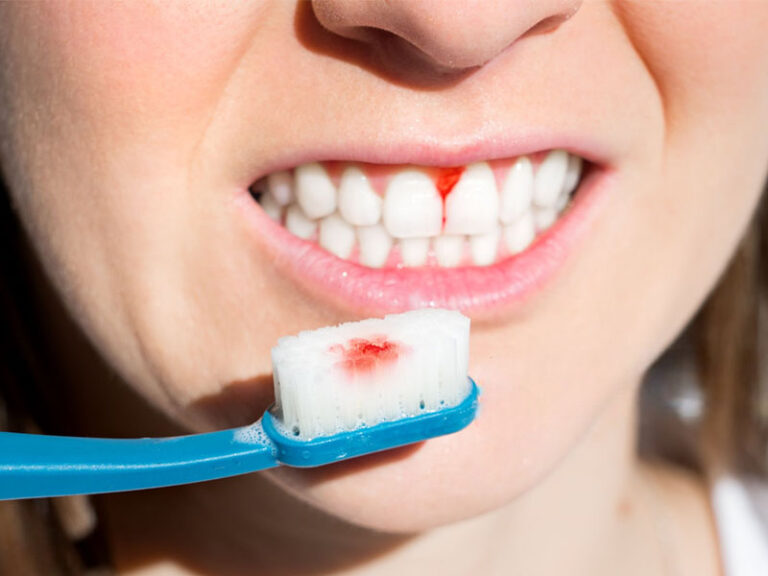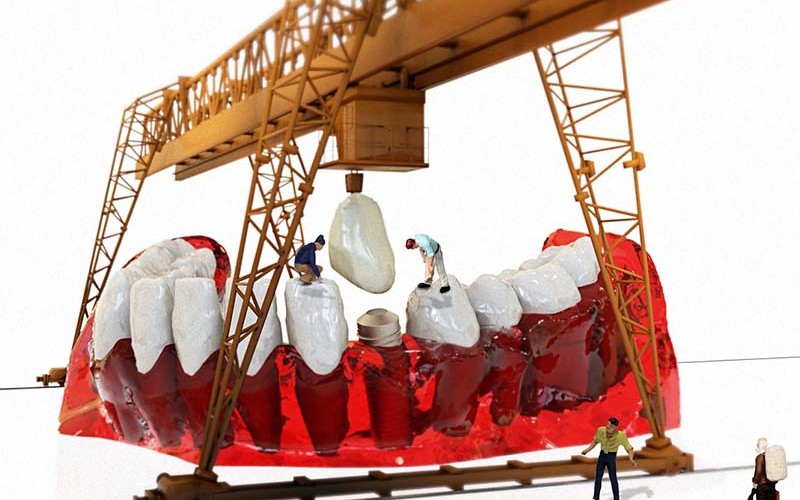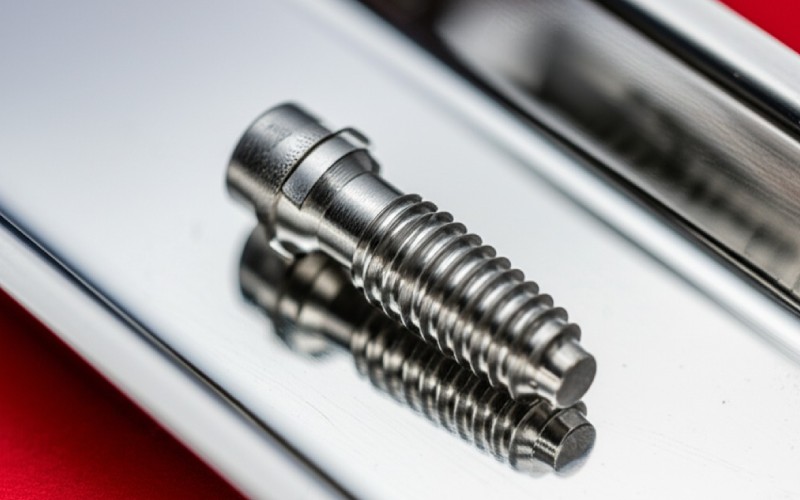
Your Dental Implant: How Implant Contact and Diameter Create Strong Stability
I’ve been in this business a long time. I’ve seen what makes a Zahnimplantat work and what makes it fail. It’s not magic. It’s science. The success of your new tooth comes down to a few key things. How well does the implant contact the bone? What is the implant diameter? How strong is the bone-implant interface? All of this adds up to the stability of dental implant. A good, strong connection is everything.
This article is for you if you want to understand your implant treatment. I will tell you what I know in simple words. We will look at the tiny details that make a big difference. We will talk about bone-implant contact. By the end, you will know why one dental implant can last a lifetime. You will feel more sure about your choice.
Inhaltsübersicht
What Is a Dental Implant and Why Is It a Big Deal?
I often get asked, “What is a dental implant?” Think of it as a new root for a missing tooth. It is a small post, usually made of metal. We place this post into the jawbone. This special post is a type of oral implant. It acts as a strong base. On top of this base, we can put a new tooth, a crown.
Why is this a big deal? Because a dental implant feels and works like a real tooth. It lets you eat what you want. It lets you smile with no fear. A good implant treatment can change a person’s life. When the implant and bone join together well, you get great implant success. It is a choice for a full and happy smile for many years. A dental implant is a great choice.
What Are Dental Implants Made Of? A Look at Implant Material.
People want to know what the implant is made of. The most common implant material is titanium. For decades, we have used titanium. A titanium implant is very strong. It is also very safe for the body. Your body does not see it as a strange object. This is a very good thing. This special implant material helps the bone grow right up to it.
The choice of implant material is key. The modulus of the implant material is a term we use. It means how stiff it is. We want the elastic modulus of the implant to be close to bone. This helps share the force of chewing. A titanium dental implant does this very well. This is why a titanium implant is a top choice. The implant material must be perfect for the job.
How Does a Full Implant System Work Like a Real Tooth?
A dental implant is more than just one piece. It is a full implant system. This system has three parts. First is the implant body. This is the screw that goes into the bone. It is the root of your new tooth. The implant system is made to bond with your jaw. This bond is how the implant to the bone becomes strong.
The second part of the implant is the abutment. It is a small connector. It sits on top of the implant body. The third part is the crown. The crown looks just like a real tooth. It attaches to the abutment. All three parts work together. They make a strong, stable new tooth. This connection between the implant and the bone is what makes the whole system work so well.
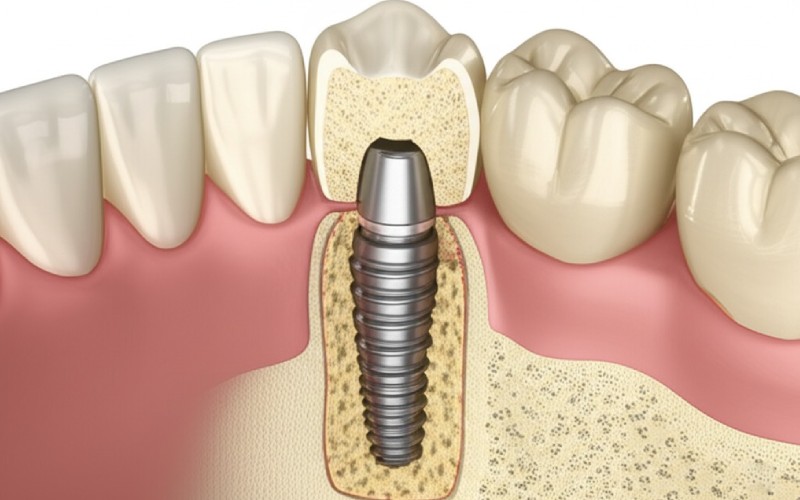
Is a Dental Implant Just a Small Orthopedic Implant?
This is a smart question I hear sometimes. Is a dental implant like a tiny orthopedic implant? In many ways, yes. An orthopedic implant, like a new hip or knee, also uses titanium. The goal is the same. We want the bone to grow onto the implant. The implant material is often the same. The science is the same. There are many implant applications in medicine.
But there are big differences. An oral implant lives in the mouth. The mouth has germs. A dental implant must be able to handle this. The forces are also different. An orthopedic implant carries body weight. A dental implant takes the force of chewing. So, while they are cousins, a dental implant is special. It has its own needs. The implant stiffness for an orthopedic implant is different than for a dental implant using a similar material. The orthopedic implant has a tough job. The dental implant also has a tough job. I have seen an orthopedic implant up close. I have seen a dental implant up close. They are both amazing.
Why Is the Implant Surface So Very Important for Success?
The implant surface is where the bone meets the dental implant. It is the most important place. The link between the implant surface and bone is everything. We call this special connection the bone-implant interface. A good, strong bone-implant interface means a happy, long life for your dental implant. The bone must love the implant surface.
For the bone to grow strong, it needs something to hold on to. A smooth implant surface is not good. The bone cells would just slide off. We need a rough implant surface. This gives the bone cells many little places to grab. This process is called implant osseointegration. It is the magic link between the bone and implant. The better the contact with bone, the stronger your oral implant will be. The surface of the implant is a key part of the plan.
What Is Implant Surface Treatment and How Does It Help the Bone?
So, how do we make the implant surface rough? We use a special process. It is called implant surface treatment. This is a big step in making a good dental implant. We can use tiny sand particles to blast the implant surface. Or we can use a special acid to etch it. Both ways create a rough implant surface. This rough layer of the implant is perfect for bone cells.
This rough surface means more bone-to-implant contact. More bone touches the implant surface. This is what we want. The goal is to have the bone cells make direct contact with the implant surface. The implant surface in contact with bone is the foundation. The better the surface in contact with bone, the better the result. The effects of implant surface are huge. A good surface is not an option; it is a must. The health of the tissue around the implant surface depends on it. The bone growth is affected by the implant surface.
Does the Size of a Dental Implant Change How It Works?
Yes, size matters. The implant size is a key choice we make. This includes the implant diameter and the implant length. A wider and longer dental implant has more surface area. The surface area of the implant is important. More surface area means more space for the bone to connect. This often leads to better implant stability.
But we cannot always use a big dental implant. The choice depends on how much bone you have. We need to plan the dental implant design with care. The implant design must fit your jaw. There are many different implant shapes and sizes. These different implant geometries help us find the perfect fit for you. The selection of the implant is a team choice between you and your doctor. We look at the area of the implant body and the length of the implant to make the best plan.
How Do We Know for Sure if a Dental Implant Is Stable?
Implant stability is the goal. But how do we test it? We have two types of implant stability. The first is primary implant stability. This is how tight the dental implant is right after we put it in. We can feel this when we do the implant insertion. Good implant primary stability is a great start. The primary stability of dental implants is very important.
Then, we have a way to measure it. We use a tool for resonance frequency analysis. This sounds complex, but it is simple. The tool sends a tiny, safe pulse to the implant body. It measures how the dental implant vibrates. This gives us a number. The number is called the implant stability quotient. A high implant stability quotient means high implant stability. This test, resonance frequency analysis, gives us peace of mind. We know the stability of the implant is good. We can check the implant stability using this smart tool. This is how we confirm secondary stability of dental implants, after the bone has healed. The implant stiffness helps this process.
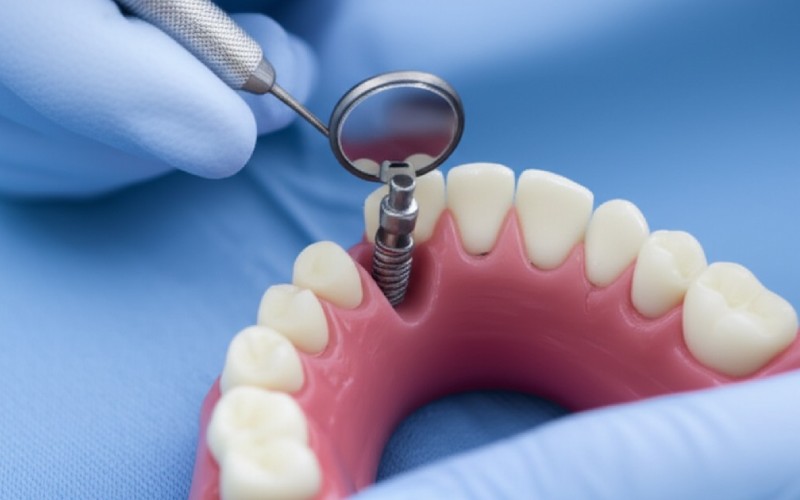
What Can Cause a Dental Implant to Become Loose or Fail?
Even with great care, implant failures still occur. It is rare, but it can happen. An implant failure is sad for everyone. One cause is infection. Germs can get around the implant. This can hurt the bone. Another cause of implant failure is when there is not enough good bone. The bone tissue surrounding the implant must be healthy. This is why we check it first.
Sometimes, a problem is too much force, too soon. A new dental implant needs time to heal. If you chew hard food on it right away, the implant could move. This can lead to implant loosening. This migration of the implant is not good. An implant may also fail if the person smokes. Smoking slows down healing. It is a big risk for implant failure. The stresses at the bone-implant interface can be too high. The implant and the surrounding tissue need to be cared for. The presence of the implant changes things in the mouth. We need to be careful.
How Can We All Work for Your Long-Term Implant Success?
A long-term implant is a team effort. It starts with good implant placement. A skilled doctor will put the dental implant in the perfect spot. The implant insertion must be done with great care. This ensures good implant contact from day one. Good bone to implant contact is the first step. The bone tissue and the implant must start their life together on the right foot.
Your part is just as important. You must keep your oral implant clean. You must brush and floss around the implant. This keeps the gums and bone healthy. The bone tissue around the implant needs a clean place to live. When the implant and bone tissue are happy, the dental implant is happy. Good care will prevent most problems. This teamwork is the best way to get great implant success. A happy oral implant can last for the rest of your life. This is what I want for you. This is what we all work for with every dental implant.
Dinge zum Merken
- A dental implant works like a new tooth root. It holds a new tooth.
- The implant material is usually titanium. It is strong and safe.
- The implant surface is made rough on purpose. This helps the bone to hold on tight.
- The size of the dental implant matters. A bigger implant size can give more stability.
- We measure implant stability. This tells us if the implant is strong and safe.
- Implant failure is rare. It can be caused by infection or too much force.
- Good care at home is very important. Keep your dental implant clean for a long life.

